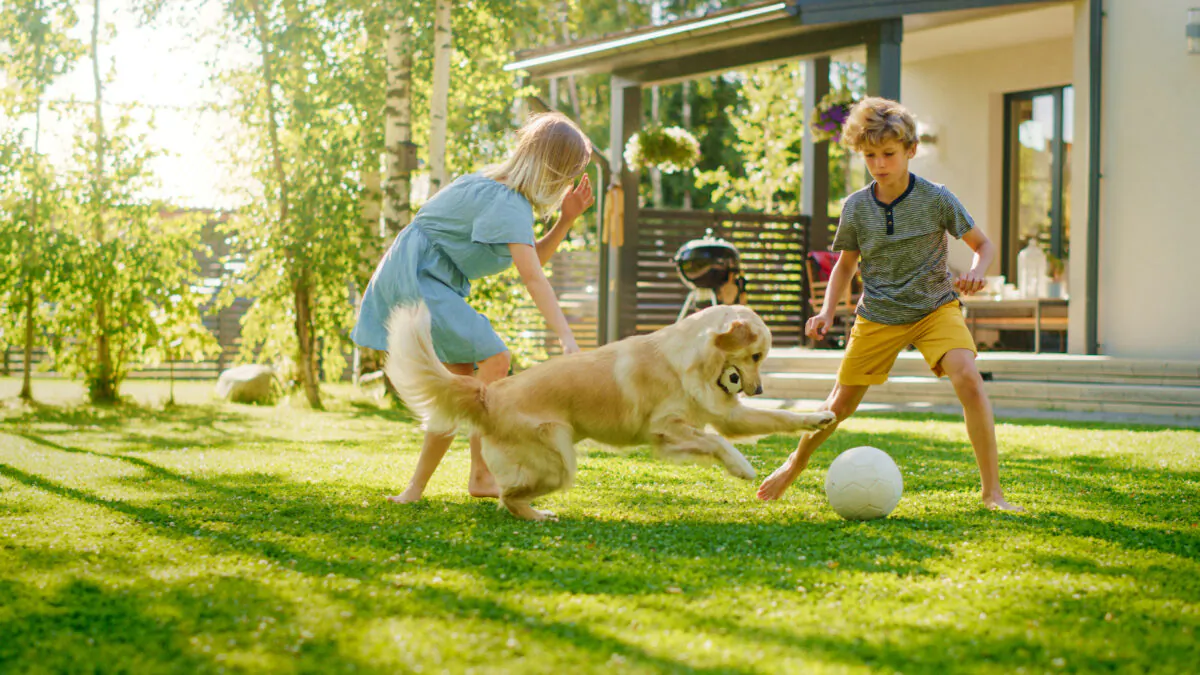
Summer isn’t over by a long shot. Experts weigh in on how to enjoy the next few months. News you can use. No charge.
How to Slow Down This Summer
Tips on how to use this season to truly relax and unwind
By Barbara Danza
The Epoch Times
July 4, 2023

Summer is the time to partake in all kinds of activities that bring joy and rest. (New Africa/Shutterstock)
Ah, summer. It’s time to relax, unwind, and enjoy long summer days sipping lemonade without a care in the world.
That ideal vision may seem elusive to many of us, but we can capture its essence more often this season if we try.
Stop Hurrying
Maybe you’re a parent who just completed the marathon known as the end of the school year, or you’re coming off of a busy season at work. It can be challenging to set down a habit of hurrying if you’ve been at it for a while.
Notice when you’re rushing and hurrying through the parts of your day that really aren’t all that urgent. Do you need to make that sandwich at breakneck speed? Is it that important you take the fastest route to run your errands? Do you have to see every task as something to get over with as soon as possible?
In our efforts to be more productive and efficient, we can lose sight of appreciating the life that is in front of us. This summer, allow yourself to not just get your to-do list over with but also enjoy the moments of your life as you go about them. Slow down. Try not to always be in a hurry. Smile and enjoy the little things.
Check Your Thoughts
We can find ourselves stuck in detrimental thought loops when life gets busy or overwhelming. If you’re coming off of a busy season, allow summer to give you an opportunity to cut off thought loops that increase your worries, your frustrations, your impatience, and your negative emotions. Observe your thoughts and notice when they repeat and spiral. Choose instead to find things to appreciate in your day and in each moment.
Summer Hours
Many companies employ “summer hours,” inviting employees to end their days early on Fridays, for example. Our modern lifestyles often entail bringing work home or working from home endlessly without taking a break or enjoying time with family. Strive this summer to create more balance in this regard, working a little bit less if possible and setting more consistent boundaries between work time and free time.
Turn Off Screens
As a society, we are spending an exorbitant amount of time, attention, and energy on screens. Allow your mind to get a break from the constant onslaught by doing all you can to reduce your use of screens this summer. It may be difficult at first; their addictive nature is no secret. But the peace of mind is worth the effort.
Minimize Your Calendar
Summer is a great time to reassess the obligations you’ve set up for yourself. Check your calendar and see whether decluttering might allow you more time to unwind this summer. What is no longer a priority or necessary? What would be better off rescheduled or delegated? Freeing up time in summer not only allows you the time that event would have taken but also all the time and energy you would have devoted to anticipating and preparing for it. Clear your calendar wherever you can.
Have Fun
What’s your idea of fun? For some, fun is daring adventure; for others, it’s reading a book in a hammock. Don’t forget to partake in the activities that bring you joy this summer. Spend time with family and friends. Rekindle your love for a hobby or pastime. Let go of needing every moment to be a productive one or every hour to be efficient. It’s summer. Have some fun.
—Barbara Danza is a mom of two, an MBA, a beach lover
AND MORE from Danza:
Summer: Time to ‘Deschool’
Encourage your children to reengage with their interests and the world around them, and watch them shine
MAY 23, 2023

Summer is the ideal time to reconnect with your kids, listen to them, play together, and get to know what their current interests are and what lights them up inside. (Gorodenkoff/Shutterstock)
If you are a parent of schoolchildren approaching the glorious summer break, might I suggest you use the time to reap the many benefits of deschooling.
Deschooling is a process familiar to many homeschoolers during which you and your family shake off and let go of the many notions, assumptions, and beliefs about learning that have been impressed upon you and your children by school.
We’ve all been taught, for example, that in order to learn and become educated, you have to go to school. A cursory glance at many great scholars and achievers throughout history proves otherwise—as does any independent learning by you or your children.
Some argue that our modern-day public school system actually impedes learning and is, in reality, detrimental to education. (To learn more, look into the work of John Taylor Gatto, a New York City and state teacher of the year who shared his eye-opening experiences; or simply consult the alarming data measuring literacy rates in the United States.)
The truth is, one doesn’t need school to learn. Summer is an opportune time to uncover that spark of curiosity, that joy of learning that your children may have exhibited when they were younger—before they went to school.
Benefits of Deschooling
Quite the opposite of the so-called “summer slide,” deschooling for the 10 or 11 weeks of summer break will allow your children to remember the natural processes of tinkering, exploring, reading for enjoyment, using imagination, creating, building, designing, inventing, pretending, and playing. These are the activities that, when self-directed, result in immeasurable learning opportunities.
When allowed the freedom to partake in these rites of childhood without pressure or coercion, your children will be free to experience their innate enthusiasm and curiosity that school tends to leave little room for.
How to Deschool
Deschooling is simple and joyful.
Let go of the hustle and bustle of the school year schedule and become one with the calm of summer. Reconnect with your kids. Spend time with them, listen to them, play with them, and get to know what their current interests are and what lights them up inside. In essence, do all the things your children are naturally inclined to do when they aren’t in school.
Rather than screen-centric activities, encourage ones that engage their minds and hearts. Spend lots of time outdoors and in deep conversations with your kids. Listen to and watch them closely. Notice how their innate curiosity begins to reengage with the world and how the drudgery of school becomes a distant memory. You’ll feel like you’re doing a lot of nothing but will likely at some point find yourself astonished at how much they’re learning without the “help” of school. That’s when you’ll know deschooling is working.
Visit the library and bookstores, and stock up on a feast of delightful reading. Enjoy an audiobook here and there. Play music. Watch documentaries. Go to the park. Swim in the ocean. Start a project just for fun.
Amid it all, your child is going to learn things. And so are you.
You’ll know deschooling is working when you witness your child’s true self shining through brightly once again. You’ll experience the joy of deschooling when you stop worrying about your child’s reading level or what the other kids are learning in their grade. You’ll understand the deep benefits of deschooling when you begin to ask yourself how you were ever convinced that conventional schooling was the only way for your kids to learn.
Deschooling, simply put, is letting go. Take as long as you need.
AND FINALLY…
10 Alternatives to Watching TV: Distancing Your Family From Screens This Summer
Cut down on television time while doing more fun family activities
By Walker Larson
The Epoch Times
JULY 4, 2023
American households average nearly 8 hours of TV watched per day, according to Nielsen, a market-research firm—and that’s not counting time spent streaming on computers or mobile devices. The Nielsen data count any time when at least one person is watching TV in the household. So in Nielsen’s methodology, if three people watch a program for two hours, that still counts as only two hours, not six. Clearly, Americans love their shows.
According to the Bureau of Labor Statistics (BLS), in the years 2013–2017, Americans spent about 55 percent of their leisure time watching TV. Unlike Nielsen, the BLS included in its figures any video consumption, whether cable TV proper or movies and videos on computers, phones, and tablets.
These are staggering figures. It would take a whole series of articles to try to explain why Americans spend so much time in front of the tube, though perhaps one of the main reasons is Robert Putnam’s thesis that Americans have largely withdrawn from communal activities and social and civic engagement. Where evening entertainment used to be found around the hearth or at the dance hall, supper club, bowling alley, or neighborhood park, people today want a relaxation environment that they have control over and that allows for passive consumption. Educator John Senior says of TV, “Its two principal defects are its radical passivity, physical and imaginative, and its distortion of reality.”
The purpose of this article is to offer 10 ideas for family activities that don’t involve a screen—10 undertakings more rooted in the real. These activities present enjoyable, relaxing, and healthy alternatives to binge-watching the latest hit series, and they can also help build bonds within families, neighborhoods, and communities. Consider challenging yourself to a TV fast for a few weeks and try these pastimes instead.
Play a Game or Sport
You might struggle the first time you miss the broadcast of the big game on the weekend, but a love of sports doesn’t have to be confined to the sofa. In the words of Senior, “If you really like football, get out on Saturdays and play it with the boys.” Then there are board games, card games, and even Victorian parlor games to try—who doesn’t want to play a game with the sophisticated name “The Minister’s Cat”? Or “Squeak Piggy Squeak”? Other favorites in my circles include “Four on a Couch” and “Psychiatrist.”
Play Music Together

An old-fashioned pastime worth reviving: making music together as a family. (Biba Kayewich)
Shakespeare tells us, “The man that hath no music in himself / Nor is not moved with concord of sweet sounds / Is fit for treasons, stratagems, and spoils.” And again, he says that music is “the food of love.” It is also traditionally the food of a healthy home life. Learning a few folk songs requires less effort than most people think. If someone knows piano or guitar, all the better. The sweet sounds will swell inside your living room, and they’ll be all the sweeter when composed of the voices of your own family and not some distant pop star over the radio. In the days before electric lights, friends and family could still keep company through song long after the shadows had fallen.
Visit Friends and Neighbors
Do you know your neighbors? If not, now’s the time to rectify that. Bring them cookies. They may be remarkable people. Or, if you feel less adventurous, invite over all your family friends for a party. You might include a theme, such as “medieval dress only.”
Read or Read Aloud
Countless benefits flow from reading aloud to your kids, such as improved vocabulary and communication skills, instilling of heroic values, improved test scores, increase in empathy, and bonding between parent and child. A wealth of wisdom and delight lies open to us through our libraries, whether personal or public. Search out the classics. There’s a reason they’ve been treasured generation after generation.
Go for a Walk
And bring a field guide. While it’s great to just enjoy the sights, smells, and sounds, learning the names and habits of the various birds, animals, insects, trees, and plants you encounter adds depth and pleasure to the experience. Kids will enjoy the challenge of trying to match specimens to the entries in the guidebook.
Handcraft a Project
This item combines well with reading aloud, especially for people who like to keep their hands at work. Sewing, embroidering, fly-tying, knitting, carving, or even just doing a puzzle as a group brings together relaxing physical movements, bonding time, and the satisfaction of making something useful or beautiful by your own efforts.
Cook a Multi-Course Meal Together
Even if you’re no great chef, planning an evening of cooking can be a chance to experiment and have fun. Try making something you’ve never made. Spread the tablecloth. Light the candles. Bring out the family silver (if you’re lucky enough to have such an heirloom). Serve multiple courses. Dress to the nines. Some family members might even like being waiters or waitresses for the night.
Host a Traditional Square Dance
Again, this activity is not so difficult as you might imagine, though it will take more work than most of the other items on this list. You will need to find a fiddler (ideally with a backup guitarist), a caller, and a large open space. Absurd though it may sound, I’ve never attended a square dance where I haven’t seen huge grins on the faces of everyone, young and old alike, by the night’s end—even if very few have prior dancing experience. You can find many resources online to begin the process.
Star Gaze
Maybe try to identify the constellations and the Greek myths associated with them. Or simply lie there and stare at the grandeur of it all.
Just Talk
Quality conversation is an art, little practiced, and the substrata on which true human connection and relationships are built. In some sense, too, it’s the sustaining force of human rationality itself. If you need help getting started, snag a pack of Questions for Humans conversation cards.
Re-creation
Recreation has the word “creation” in it, and that should tell us something. Recreation used to mean producing something, making your own fun, not just passively consuming “entertainment” generated by mega-corporations for their own financial and often political benefit.
And really, our free time ought to go further than mere recreation. The true understanding of the term “leisure” encompasses something even more important and noble than fun and relaxation. It’s among the highest human acts—just existing in the moment and celebrating all that is good in this world. According to Philosopher Josef Pieper in “Leisure the Basis of Culture,” “Leisure is the disposition of receptive understanding, of contemplative beholding, and immersion—in the real.”
Take back your free time and make it truly free—the freedom that goes with living out our human potential in all its fullness.
—Walker Larson teaches literature and history at a private academy in Wisconsin, where he resides with his wife. He holds a Master’s in English literature and language
Pingback: Saturday Special (07/22/2023): More trouble for the US military | This Just In… From Franklin, WI